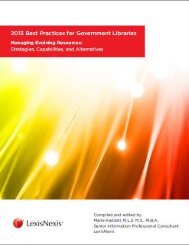2012 Best Practices for Government Libraries
2012 Best Practices for Government Libraries
2012 Best Practices for Government Libraries
Create successful ePaper yourself
Turn your PDF publications into a flip-book with our unique Google optimized e-Paper software.
222<br />
BEST PRACTICES <strong>2012</strong><br />
Developing a New Course – The Bluebooking Series at the DOJ<br />
<strong>Libraries</strong><br />
By Kera Winburn & Mariana Long, Reference Librarians, U.S. Department of Justice<br />
The Department of Justice (DOJ) <strong>Libraries</strong> has a robust training program that offers<br />
a variety of training opportunities <strong>for</strong> our patrons. These courses include Finding<br />
Company In<strong>for</strong>mation, Expert Witnesses: Finding, Investigating, and Using Expert<br />
Witnesses, Legislative History Research, and many more. Librarians develop these<br />
courses based on their areas of expertise.<br />
These classes are developed and taught under the auspices of the Justice Library’s<br />
Training Committee. Every DOJ librarian who teaches a class is automatically a<br />
member of the Training Committee, which is under the leadership of the Training<br />
Co-Chairs. One co-chair is responsible <strong>for</strong> training in the local area (“DC Training<br />
Co-Chair”), while the other is responsible <strong>for</strong> training outside the DC area, as well<br />
as taping of classes.<br />
The DC Training Co-Chair plays a number of coordinating roles in the Training<br />
Committee. First, she coordinates the scheduling of classes by the various<br />
instructors to reduce conflicts in training schedules, as well as to ensure certain<br />
core classes, like those in the Legal Research Series, are offered in a logical order.<br />
Second, <strong>for</strong> a number of classes, she handles all of the supporting training logistics<br />
like locating training space, setting up vetting sessions <strong>for</strong> each course, and<br />
registering students. Finally, she spearheads the marketing of these classes by<br />
creating a monthly list of training courses that are distributed to the Department by<br />
a number of methods, including direct mailings to certain divisions via newsletter,<br />
as well as distribution to Division Training Coordinators. These Division Training<br />
Coordinators, in turn, advertise directly to their divisions. This relationship is<br />
beneficial <strong>for</strong> both parties because training needs are being fulfilled, while our<br />
library’s research capabilities are being marketed.<br />
In the summer of 2011, the Division Training Coordinators contacted the Training<br />
Committee to discuss the development of a Bluebooking Series. In the past, most<br />
divisions would send their paralegals and support staff to a training facility in<br />
Columbia, South Carolina to receive bluebooking training. However, in this era of<br />
shrinking budgets in the federal government, the Division Training Coordinators<br />
were in need of other viable options and felt the Library Staff could meet their<br />
needs. Volunteers from the Training Committee met and developed a training<br />
curriculum organized around the following topics: Introduction to the Bluebook;<br />
Cases; Statutes, Legislative Materials, Uni<strong>for</strong>m Acts, Court Rules & Constitutions;<br />
Administrative Materials & Electronic Databases; Secondary Sources; Punctuation,<br />
Quotations, Omissions, Alterations, and Parentheticals; and Short Forms, Signals,<br />
Related Authority & Capitalization.



